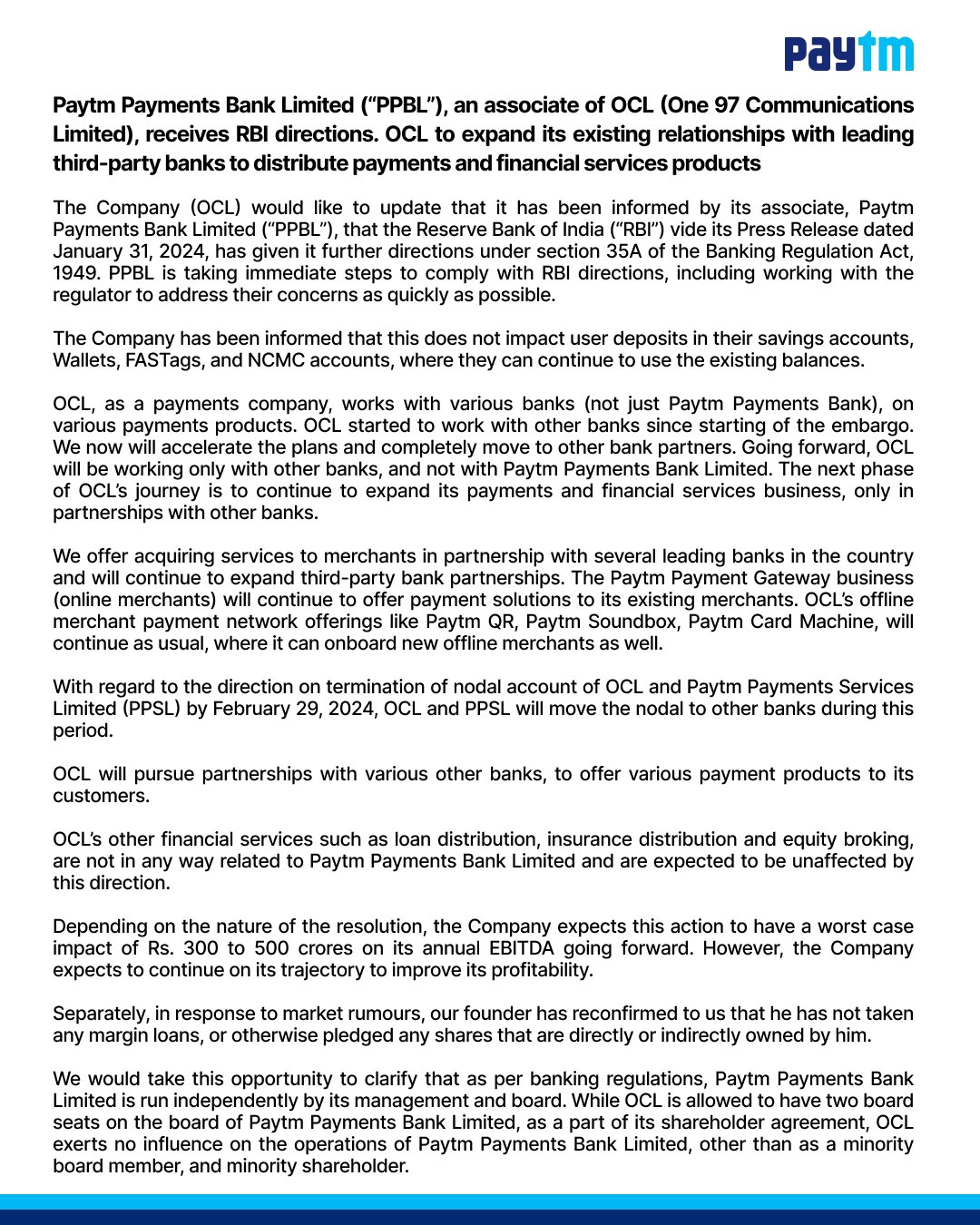MUMBAI, Feb 7 – One97 Communications, the parent company of Paytm Payments Bank, saw its stock prices surge over 9% after founder Vijay Shekhar Sharma met with Finance Minister Nirmala Sitharaman. The meeting focused on RBI’s crackdown barring the bank from onboarding new customers over continued non-compliance. However, the Finance Minister emphasized that Paytm must resolve regulatory issues directly with RBI and comply with their directions.
RBI Bars Paytm Payments Bank from Onboarding New Customers

On January 31st, the RBI barred Paytm Payments Bank from onboarding new customers and directed it to appoint an IT audit firm to conduct a comprehensive audit.
This stringent action follows persistent non-compliances and material supervisory concerns observed at the bank. Specifically, the RBI highlighted violations of operating guidelines and non-compliance with directions on KYC norms.
Consequently, Paytm Payments Bank cannot onboard new customers for its wallets, prepaid cards, UPI handles, or any other services. Existing customers can utilize their balances but cannot add more money. The bank can, however, continue settlements for merchant partners.
Clampdown Causes Shares to Plunge 40%
The regulatory clampdown caused Paytm’s parent company, One97 Communications shares, to plunge over 40% since January 31st. However, it has rebounded slightly after the meeting between Sharma and Finance Minister Nirmala Sitharaman.
Analysts have raised corporate governance concerns around Paytm, especially the lack of independent directors and no CEO for the payments bank.
With over 300 million registered consumers, Paytm has the largest market share of UPI transactions in India. Its wallets and prepaid instruments have over 100 million users.
Hence, the RBI action could adversely impact a vast customer base in fintech-savvy India, raising public policy concerns.
Paytm CEO Meets Finance Minister

On February 7th, Paytm founder Vijay Shekhar Sharma met Finance Minister Nirmala Sitharaman and top finance ministry officials.
As per sources, Sitharaman informed Sharma that the government does not intervene on regulatory matters within RBI’s domain. The Finance Minister advised Paytm to comply with RBI requirements and address their concerns adequately.
Earlier on February 6th, Sharma had also met senior RBI officials to discuss the rapidly evolving situation. However, the regulator reportedly reiterated compliance requirements and did not provide any reprieve so far.
Startup Founders Write to Government Officials
On February 6th, nearly 75 startup founders wrote to Prime Minister Narendra Modi, Finance Minister Nirmala Sitharaman, and top RBI officials.
They have urged a rollback of the regulatory restrictions, citing adverse impacts on entrepreneurship and innovation culture. Signatories include executives from prominent startups like Zomato, Ola, and MakeMyTrip.
The letter states that “measures taken undermining public confidence and restricting the ability to innovate will retard progress” and have “unintended consequences.”
Paytm Shareholders Write to Company Board
Meanwhile, investment firms like Blackrock, Canada Pension Plan Investment Board (CPPIB) and HDFC have written to Paytm’s board.
They have raised concerns around related party transactions, the structure of the board, and the management’s overall credibility in handling such regulatory matters.
Per the shareholders, recent developments have put the company’s credibility at risk and require urgent course correction. Otherwise, it would substantially erode investors’ confidence beyond recovery.
The shareholders have also questioned the hasty onboarding of Paytm Payments Bank’s new CEO in January amidst the deteriorating regulatory relationship.
While Paytm is engaged with RBI and government officials, quick resolution seems unlikely. Paytm needs urgent measures to address gaps in compliance, governance and risk management.
Restoring confidence amongst users, investors and regulators remains the biggest challenge for founder Vijay Shekhar Sharma to prove the startup is built on solid foundations.
The next few weeks will prove critical for the company’s future as India’s most valuable fintech firm.
Read more about ICICI Bank Scandal, UPI’s Contribution to the National GDP here.












Comments 2